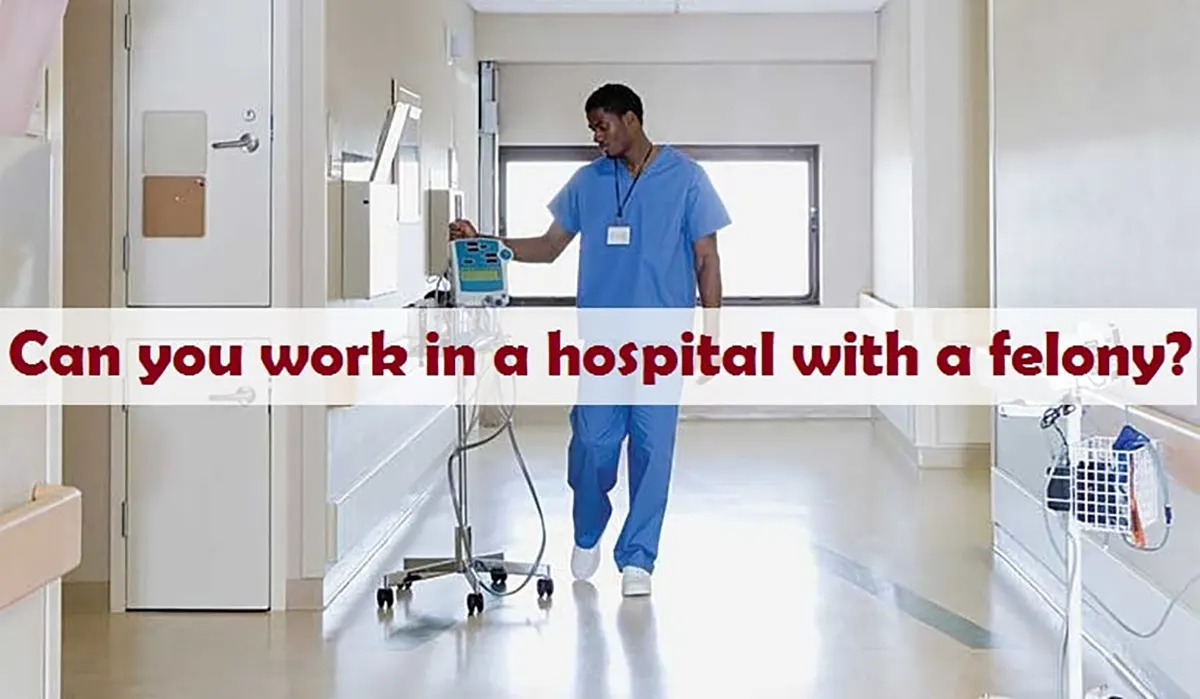Many jobs in hospitals are available to felons, however, it is very difficult for a felon to enter into the high-paying professions.
Not only do these positions need years of education, which may be difficult for a felon to fund. But these positions are also usually in highly trusted areas, and felons do not fulfill the idea of a responsible and caring individual that medical professions are thought of.
Quick Navigation
- Why would a felon want to work in a hospital?
- Can you work in a hospital with a felony?
- Which jobs are available for felons?
- Conclusion
Why would a felon want to work in a hospital?
As the medical sector grows, there are a number of jobs available across the U. S. every year which a felon could do.
Additionally, the average pay stands between $35, 000 and $80, 000 per annum depending on the job – although the jobs can be stressful and have unsociable hours, the pay can be excellent.
Can you work in a hospital with a felony?

Which jobs are available for felons?
Generally, hospitals and other medical facilities such as clinics will run background checks on any applicants.
Due to the number of qualified applicants for a few positions, it is likely that there will be a number of non-felon applicants to these positions as well.
Some positions which would be available to a felon could include medical assistant, nurse aid, home health care aide, medical administrative assistant, and medical coding/billing assistant.
Now, of these jobs, only the medical assistant – an individual who works with a physician, taking notes, filling in vital signs on records, and performing basic administrative duties – and the nurse aide – performing the basic caring duties of the nursing team, such as feeding patients, changing their sheets, or any other daily activity – are positions which will require the individual to work on the front line within a hospital.
A home health care aide will perform similar duties to a nurse aide, but in a care home or personal home setting.
A medical administrative assistant would be performing administrative tasks in order to free up the medical professions so that they can perform to the best of their ability in the medical sense.
A medical coding/billing assistant will aid with the financial aspects of the hospital, so they are extremely unlikely to find themselves working on the front line.
Although these are low-level jobs, having a degree will greatly aid your case. You need to show that, not only are you fully capable of the job, but the position is so perfect for you that they cannot consider anyone else.
If the position needs a license, you will need to make sure you apply for that too.
Which jobs aren’t open to felons?
Felons cannot generally work in the higher responsibility (and, by extension, the higher paying) jobs due to a number of reasons.
These positions include a Doctor (MD) a Nurse, or any position which would require the individual to perform medical examinations. This obviously closes the field of positions that are available to a felon.
If the felon has committed a sexual or physical abuse felony, they will have almost no chance of entering the profession.
As medical professions are entrusted to help the public every day, those crimes tell prospective employers that you do not respect the people around them. This is especially true for crimes such as rape and murder.
As a doctor or nurse will have to carry out a number of procedures that could have life or death implications, the trust that can be placed in them is of utmost importance.
Crimes that have also related to theft, fraud, or general dishonesty and deceit can cause long-term problems.
As a doctor, you will be dealing with substances and medication, which can be highly addictive and could command high prices on the black market. If you cannot be trusted not to steal for your own benefit, you cannot be trusted to work with these substances.
Medicine is a high-value industry as well – with huge amounts of money being quoted in bills and transferred in insurance claims, there is ample chance that corruption could creep into the day-to-day trade if they are not careful.
As such, it is unlikely a felon will be considered if they have a history of fraud and deception.
How can I improve my chances?

If you find a medical school that will take you on (many don’t as it can be difficult to gain a license with a felony charge), you will still need to obtain a license. This can be difficult as these processes will include a background check.
Your best bet for obtaining a medical license or applying to medical school as a felon is to remove crime from your record. This will involve seeking expert legal advice about which course of action would be best to take – pardoning, sealing, or expungement.
A pardon is granted by a governor in a state where a crime is committed. This does not remove the crime from your record, but does show that you have made the appropriate changes in your life so that you can be seen as “forgiven” by society and have paid your debt.
Sealing is when you have crimes committed as a juvenile forgiven – this generally happens with all juvenile crimes, but this may not be true in the case of serious crimes. If you seal your record, this will effectively remove the crime from your record.
If enough time has passed since the crime, and you have made positive changes in your life, such as education or long term employment, you can apply to have the charge removed from your record by expungement.
Whereas a pardon or a sealing may help if you wish to apply for a low-level job, you will need to find help expunging the crime for high-level jobs such as doctor or nurse, as this will remove the crime from in-depth background checks.
Conclusion
If you have the ability to clear your crimes from your record, then you may be able to achieve your dream of working in a hospital.
If not, for whatever reason, you may only be able to enroll for small roles and possibly even travel around, as these roles may have many applicants who have not committed crimes.

